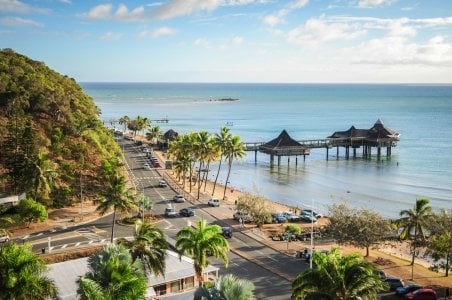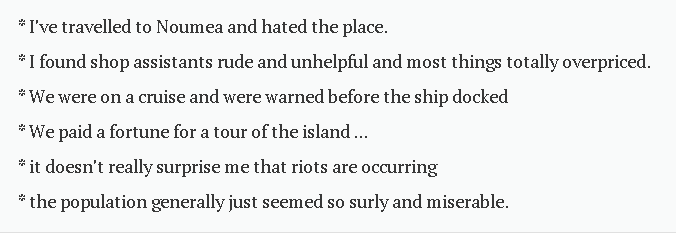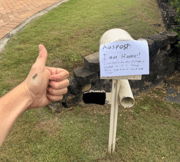Government issues travel warning as unrest escalates in New Caledonia
By
Seia Ibanez
- Replies 34
As the sun sets on the picturesque landscapes of New Caledonia, a French territory known for its stunning lagoons and rich cultural tapestry, a shadow of unrest looms over the island.
The Australian government has issued a stark warning to its citizens: exercise a high degree of caution, as a series of protests have escalated into deadly riots, casting a pall over the tropical paradise and disrupting travel plans.
The heart of the conflict lies in a recent political decision made thousands of miles away in France's Assemblée Nationale.
French lawmakers passed a reform allowing French citizens who have been residents in New Caledonia for 10 years to vote, which has sparked outrage among the indigenous Kanak population.

They feared their voting power and political voice would be diluted, as the Kanak people constitute about 40 per cent of the territory's 300,000 citizens.
The protests, which began on a Monday night, 13 May, quickly turned violent. Three young indigenous Kanak individuals lost their lives, with hundreds more injured in the ensuing chaos.
The Australian government's Smart Traveller website has since heightened its travel advice for the Nouméa metropolitan area, urging Australians to be vigilant and prepared for the possibility of violence erupting.
‘Political demonstrations and protests are occurring and may turn violent at short notice,’ the website read.
The situation on the ground is tense, with a curfew imposed in Nouméa from 6 pm to 6 am and a ban on public gatherings.
Despite these measures, protests have persisted, and there have even been reports of a jailbreak attempt at Nouméa Prison.
‘Essential services are impacted, and flights have been cancelled,’ the Smart Traveller website read.
‘The La Tontouta International Airport has closed. Avoid demonstrations, public gatherings and roadblocks.’
‘Minimise movement, monitor the media and follow the advice of local authorities.’
French President Emmanuel Macron convened a defence and national security council meeting to address the riots, while the French Interior Minister reported that hundreds of people and about 100 police officers had been injured.
Arrests have soared to 130 since the protests began.
Louis Le Franc, France's High Commissioner of the Republic in New Caledonia, has warned direly of further bloodshed if peace is not restored.
‘This needs to stop now. We already have one person dead, but if we don’t stop now, it will be carnage,’ Le France said.
‘I fear for New Caledonia, dark hours lie ahead.’
The echoes of past conflicts, particularly the pro-independence rallies of the 1980s, resonate din the current unrest, marking the most significant turmoil the territory has seen in decades.
The Nouméa Accord of 1998, which aimed to transition New Caledonia towards greater autonomy by restricting the political influence of new French immigrants, is at the heart of the current discord.
The recent legislation that sparked the protests is seen as a step back from the Accord's intentions, granting French expatriates increased voting power.
As stipulated in the Accord, New Caledonia held three referendums to decide its political future.
These were held in 2018, 2020, and 2021, providing voters with the option of independence.
However, the proposition for self-determination was rejected each time.
Notably, pro-independence parties boycotted the final referendum in 2021.
Australia's Prime Minister, Anthony Albanese, has expressed the country's commitment to its relationship with both New Caledonia and the French State.
‘We respect and support the process and the discussions underway between all parties,’ the Prime Minister said.
The Department of Foreign Affairs and Trade has echoed this sentiment, encouraging all parties to work constructively towards shaping New Caledonia's institutional future.
‘We are closely monitoring the situation in New Caledonia. Australia values our relationship with both New Caledonia and the French State,’ a spokesperson said.
‘We respect and support the referendum process under the Nouméa Accord and the discussions underway.’
You can watch ABC News’ coverage below:
Credit: ABC News Australia / YouTube
 Have you or someone you know been affected by the situation in New Caledonia? Let us know in the comments below.
Have you or someone you know been affected by the situation in New Caledonia? Let us know in the comments below.
The Australian government has issued a stark warning to its citizens: exercise a high degree of caution, as a series of protests have escalated into deadly riots, casting a pall over the tropical paradise and disrupting travel plans.
The heart of the conflict lies in a recent political decision made thousands of miles away in France's Assemblée Nationale.
French lawmakers passed a reform allowing French citizens who have been residents in New Caledonia for 10 years to vote, which has sparked outrage among the indigenous Kanak population.

The Australian government issued a travel warning as violence escalated in New Caledonia. Credit: Shutterstock
They feared their voting power and political voice would be diluted, as the Kanak people constitute about 40 per cent of the territory's 300,000 citizens.
The protests, which began on a Monday night, 13 May, quickly turned violent. Three young indigenous Kanak individuals lost their lives, with hundreds more injured in the ensuing chaos.
The Australian government's Smart Traveller website has since heightened its travel advice for the Nouméa metropolitan area, urging Australians to be vigilant and prepared for the possibility of violence erupting.
‘Political demonstrations and protests are occurring and may turn violent at short notice,’ the website read.
The situation on the ground is tense, with a curfew imposed in Nouméa from 6 pm to 6 am and a ban on public gatherings.
Despite these measures, protests have persisted, and there have even been reports of a jailbreak attempt at Nouméa Prison.
‘Essential services are impacted, and flights have been cancelled,’ the Smart Traveller website read.
‘The La Tontouta International Airport has closed. Avoid demonstrations, public gatherings and roadblocks.’
‘Minimise movement, monitor the media and follow the advice of local authorities.’
French President Emmanuel Macron convened a defence and national security council meeting to address the riots, while the French Interior Minister reported that hundreds of people and about 100 police officers had been injured.
Arrests have soared to 130 since the protests began.
Louis Le Franc, France's High Commissioner of the Republic in New Caledonia, has warned direly of further bloodshed if peace is not restored.
‘This needs to stop now. We already have one person dead, but if we don’t stop now, it will be carnage,’ Le France said.
‘I fear for New Caledonia, dark hours lie ahead.’
The echoes of past conflicts, particularly the pro-independence rallies of the 1980s, resonate din the current unrest, marking the most significant turmoil the territory has seen in decades.
The Nouméa Accord of 1998, which aimed to transition New Caledonia towards greater autonomy by restricting the political influence of new French immigrants, is at the heart of the current discord.
The recent legislation that sparked the protests is seen as a step back from the Accord's intentions, granting French expatriates increased voting power.
As stipulated in the Accord, New Caledonia held three referendums to decide its political future.
These were held in 2018, 2020, and 2021, providing voters with the option of independence.
However, the proposition for self-determination was rejected each time.
Notably, pro-independence parties boycotted the final referendum in 2021.
Australia's Prime Minister, Anthony Albanese, has expressed the country's commitment to its relationship with both New Caledonia and the French State.
‘We respect and support the process and the discussions underway between all parties,’ the Prime Minister said.
The Department of Foreign Affairs and Trade has echoed this sentiment, encouraging all parties to work constructively towards shaping New Caledonia's institutional future.
‘We are closely monitoring the situation in New Caledonia. Australia values our relationship with both New Caledonia and the French State,’ a spokesperson said.
‘We respect and support the referendum process under the Nouméa Accord and the discussions underway.’
You can watch ABC News’ coverage below:
Credit: ABC News Australia / YouTube
Key Takeaways
- Australians are warned to exercise a high degree of caution when travelling to New Caledonia due to ongoing protests against constitutional reform.
- Three people, including young indigenous Kanak people, have been killed, and hundreds injured amid violent riots.
- Political demonstrations may turn violent at short notice, affecting essential services, cancelling flights, and closing the La Tontouta International Airport.
- The Australian government is monitoring the situation, values its relationship with New Caledonia and the French State, and encourages all parties to work constructively under the Nouméa Accord of 1998.








